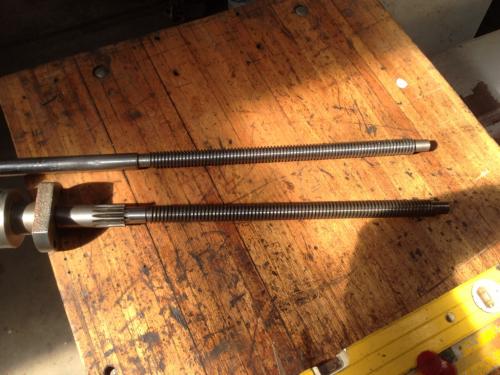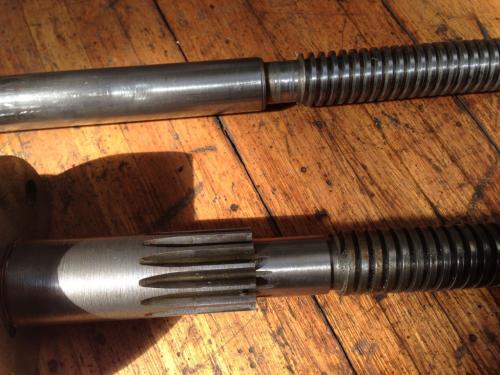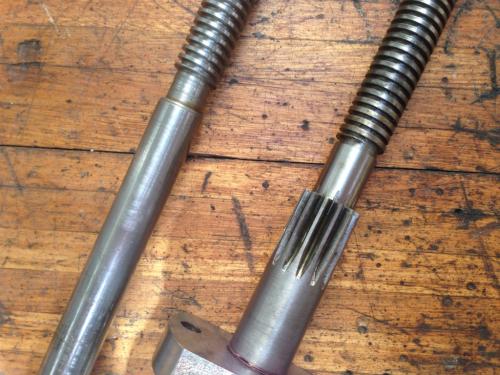04-24-2015, 07:10 AM
G'day, my first post here other than my introduction, been lurking for a while and you guys are already my go-to metalworking info source.
I have a big old Kobe lathe (have been unable to find out anything about the manufacturer, obviously Asian, I think Japanese) that my good lady gave me for my 50th birthday a couple of years ago. It has done a fair bit of work, has required a fair bit of refurbishment; the current project is the replacement of the worn-out crossfeed screw and nut. It is a 1" 5tpi, original is a square thread but I'm replacing it with Acme. I have already cut the screw, spent nearly all of today cutting the internal Acme thread in the nut blank- by far the most difficult lathe work I have tackled to date and I was very relieved to achieve what seems to be a working screw and nut . I have access to a friend's Bridgeport mill to cut the external dimensions of the nut, which will be my first effort at milling.
. I have access to a friend's Bridgeport mill to cut the external dimensions of the nut, which will be my first effort at milling.
I'm seeking some advice about grafting my shiny new Acme threaded shaft into the existing drive section of the feedscrew. The drive gear is cut into the shaft itself, so my plan is to keep the outer section of the original screw, cut off the threaded section, and graft the new threaded section onto it. What is the best way to go about this? A picture tells a thousand words (but only if you can figure out how to post it):



The section of the existing shaft between the gear and the thread is (obviously) where I plan to bore. My thought is to turn the corresponding section of the new shaft to a diameter to insert into it and either loctite, braze, thread or pin or a combination of techniques to make it stay there.
The diameter of this section is 0.900". What would be a suitable bore size? I'm thinking bore it to 0.600" which would leave .150" wall thickness- would that be thick enough to not split if there is a press fit? Should it be a press fit? Should it be a slip fit plus loctite? Should I thread it? Also wondering if I should pin it- or would drilling introduce a weak spot? Are there better options that i haven't thought of??? Your thoughts please!
I have a big old Kobe lathe (have been unable to find out anything about the manufacturer, obviously Asian, I think Japanese) that my good lady gave me for my 50th birthday a couple of years ago. It has done a fair bit of work, has required a fair bit of refurbishment; the current project is the replacement of the worn-out crossfeed screw and nut. It is a 1" 5tpi, original is a square thread but I'm replacing it with Acme. I have already cut the screw, spent nearly all of today cutting the internal Acme thread in the nut blank- by far the most difficult lathe work I have tackled to date and I was very relieved to achieve what seems to be a working screw and nut
 . I have access to a friend's Bridgeport mill to cut the external dimensions of the nut, which will be my first effort at milling.
. I have access to a friend's Bridgeport mill to cut the external dimensions of the nut, which will be my first effort at milling.I'm seeking some advice about grafting my shiny new Acme threaded shaft into the existing drive section of the feedscrew. The drive gear is cut into the shaft itself, so my plan is to keep the outer section of the original screw, cut off the threaded section, and graft the new threaded section onto it. What is the best way to go about this? A picture tells a thousand words (but only if you can figure out how to post it):
The section of the existing shaft between the gear and the thread is (obviously) where I plan to bore. My thought is to turn the corresponding section of the new shaft to a diameter to insert into it and either loctite, braze, thread or pin or a combination of techniques to make it stay there.
The diameter of this section is 0.900". What would be a suitable bore size? I'm thinking bore it to 0.600" which would leave .150" wall thickness- would that be thick enough to not split if there is a press fit? Should it be a press fit? Should it be a slip fit plus loctite? Should I thread it? Also wondering if I should pin it- or would drilling introduce a weak spot? Are there better options that i haven't thought of??? Your thoughts please!
Lathe (n); a machine tool used in the production of milling machine components.
Milling Machine (n); a machine tool used in the production of lathe components.
Milling Machine (n); a machine tool used in the production of lathe components.




